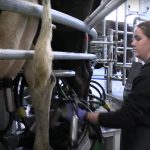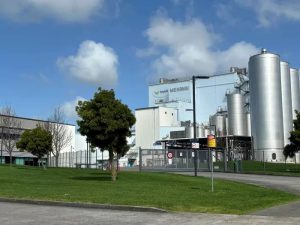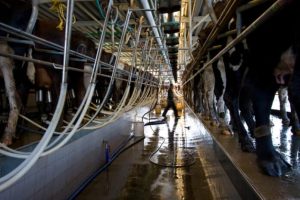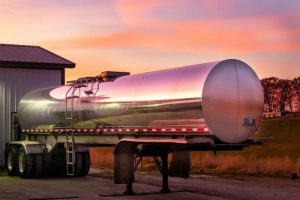
‘A lot of action quite quickly’: How the Government won over the farm lobby
Hundreds of pages of emails show farming groups have been in regular contact with Government ministers, pressing for changes to environmental rules. In some cases, the lobbying was followed by Government action.
Let’s be very, very, very clear – there is a co-ordinated attack on small Farmers…
What’s grinding our farmers down?
Farmers across the world are struggling. The global, industrialised food systems have forced many farms, especially smaller ones, out of business. But when politicians and the big agriculture lobbies blame green legislation, they are not only misleading farmers, they are risking their survival.
Europe is the current hot spot for farmer protests at the moment, but farmers’ disgruntlement is much more global than that. Earlier this week, police in northern India have fired tear gas to prevent thousands of protesting farmers demanding minimum crop prices from marching on Delhi. The reasons for the farmers’ despair may vary from country to country, but very often the protesters, and more specifically the biggest lobbies leading the protests, point to excessive environmental protection regulation.
Farmers are facing a real crisis
Farmers’ anger is legitimate and we share it. In just 15 years, the EU has lost almost 40% of its farmers, almost exclusively small and medium ones, who have either gone out of business or been bought up by their increasingly large competitors. Similar trends can be observed in other parts of the world: small and medium farms accounted for nearly half of all agricultural production in the U.S. in the 1990s, whereas today they represent less than a quarter.
The problem is the way industrial agriculture, and more broadly the global food system, is organised. It’s a system that rewards with subsidies harmful farming practices that damages people’s health, fuels the climate crisis, destroys nature and drives inequality by excluding smallholder farmers. Farmers are at the mercy of bigger corporate players up the food chain that impose low prices on the farmers’ products whilst at the same squeezing farmers at the source by raising the price of inputs, such as hybrid seeds, pesticides, fertilisers and animal drugs. This pushes smaller producers out of the market, as only factory farms can survive selling at low prices while bearing higher input costs. Big Ag’s bullying message to family businesses is: get big or get out!
At the same time, exploitative free trade agreements pushed by many governments like the EU Mercosur agreement add to the pressure, entrenchingan extractive system that expands corporate profits and power to the detriment of workers, communities, family farmers and the environment, particularly in the global South.
As the weakest link in the colossal machinery that produces our food, farmers are right to be concerned.
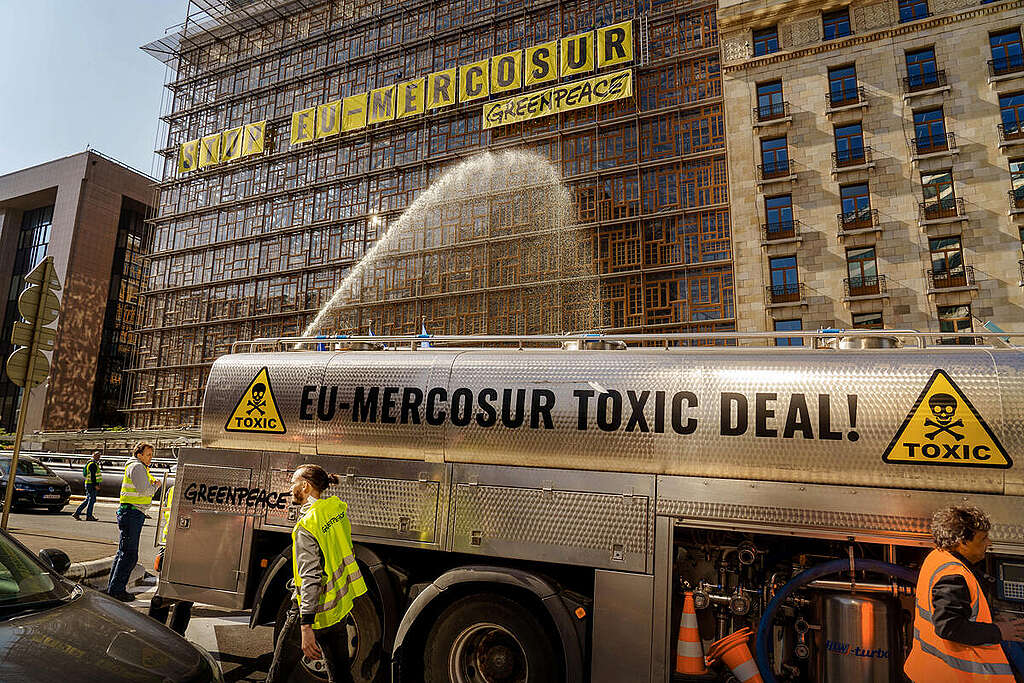
Farmers are plagued by the impacts of the climate crisis…
Human activity has triggered a climate and biodiversity crisis, with global food systems in particular being the main driver of biodiversity loss. Alongside conflicts and economic shocks, extreme weather events (and associated disturbed agricultural production) are the primary drivers of world hunger. This is poised to only get worse as the climate crisis intensifies. A single climate disaster could crush small and medium-sized farms that are already struggling to stay afloat.
…and they are being betrayed by lobby groups and politicians who claim to represent them
Instead of welcoming measures to improve ecosystem services on which farmers largely depend, certain politicians and the big agriculture lobby firms have made nature protection and climate policies an easy scapegoat. In Europe, far-right and conservative parties in particular have been criticised for their attempts to instrumentalise farmers’ discontent and point the finger at environmental regulation. This has led to France relaxing its plans on pesticide phase-out and the EU lowering agricultural targets in its 2040 climate plansand scrapping pesticide plans.
But sending angry farmers the message that green rules are to blame, while supporting a system that only works for a small percentage of giant market players, is nothing short of betrayal.
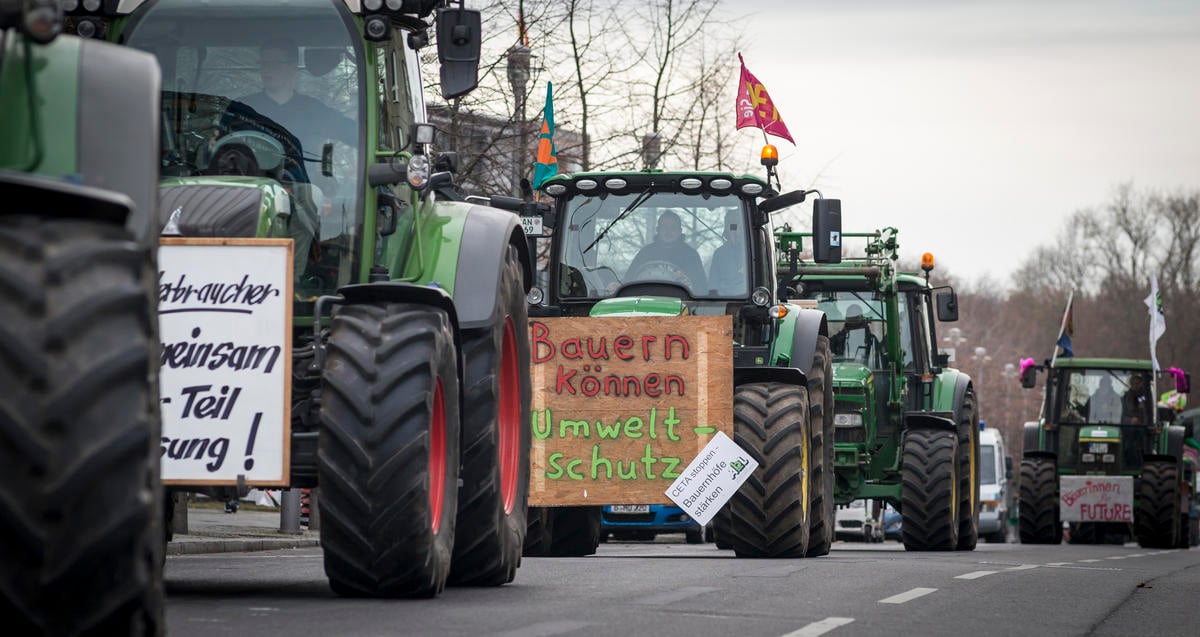
The most powerful farming lobbies like Europe’s COPA/COGECA are often the driving force behind which rules are to be strengthened and which are to be weakened. They’re the ones with the political influence. The problem is that despite their claims to represent all farmers, they have often taken positions that defend the interests of a minority of farmers: the largest and most powerful ones who thrive in a strikingly unfair food system.
In other parts of the world, conservative governments whose policies are shaped by agribusiness lobbies are leading the charge. In Aotearoa (New Zealand) for example, the newly elected Government plans to strip back environmental regulations in favour of Big Dairy’s interest, doing a disservice to ecological farmers. No regulations hold the biggest polluters accountable for the massive pollution and environmental degradation they cause, and not enough incentives or rewards compensate farmers for adopting sustainable practices.
Many politicians continue to support the largest agribusinesses and frame the crisis as “farmers versus nature”. It’s a false dichotomy that tragically hurts farmers. It deliberately shifts the focus away from the root causes of the problems farmers face and makes their situation worse until only the biggest farms are left. Farmers and nature are allies – it is markets, subsidies and lack of proper regulation that force farmers to make a desperate choice between industrial production and bankruptcy.
Farmers must be encouraged and rewarded for producing food in ways that work with nature, and for doing so for generations to come.
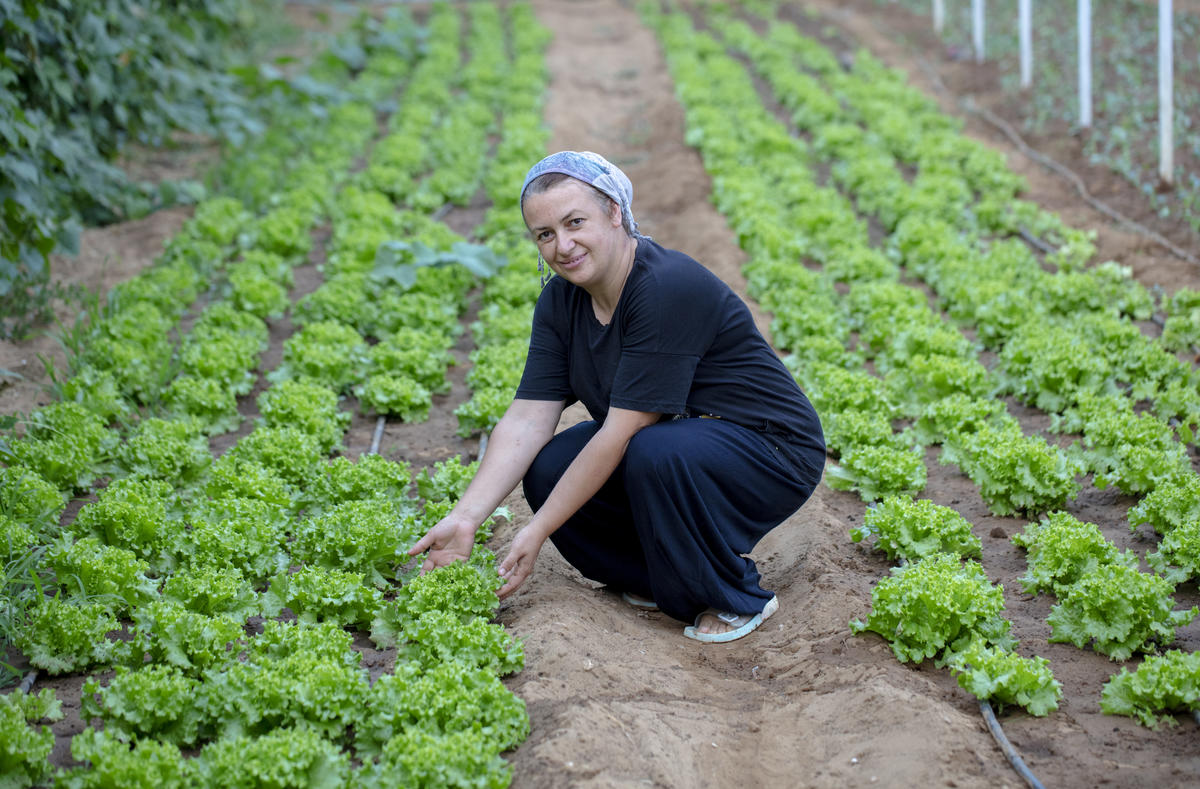
…small farmers in NZ have every right to be angry, they’ve just got the wrong target!
The Biggest Lie in NZ Politics is that NZ Dairy is the cleanest and greenest in the world when the reality is that it’s a cherry picked nonsense that leaves out pollution so NZ Dairy can get to the numbers to pretend to be clean and green.
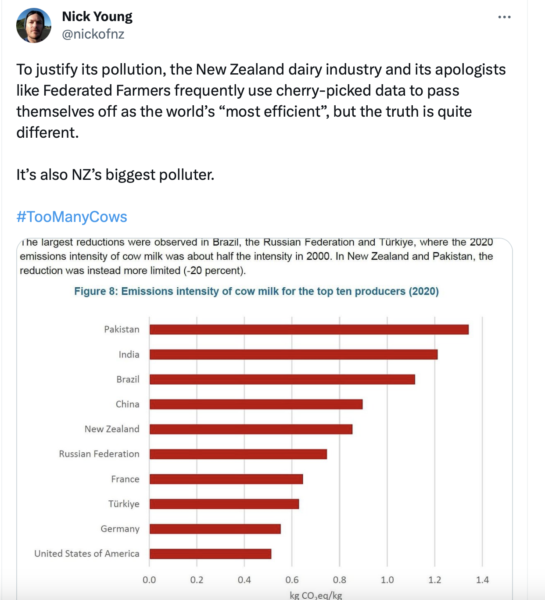
Russel Norman’s take down of this Dairy propaganda recently was just ruthless…
“NZ is the biggest seller of a simple commodity called dried milk powder, the cheapest of the cheap, and if you look at what is happening in food production around the world they are looking for more environmentally sound food products.
They are looking for higher value products.
We’ve gone down the pathway of the lowest quality commodity you can produce in the world.
NZ is mid range in terms of its environmental cost per kilogram of milk solids, there is nothing special about it, and we do feed a small number of people compared to the billions on the planet and the economics is very clear that you can be just as profitable if you pull back on the stock rate, pull back on the amount of fertiliser and actually produce a higher product.
Organics is in fact doing incredibly well globally, so why don’t we become a producer of dairy rather than the producer of the cheapest commodity on the planet which results in us trashing our water ways and being big climate producers, that’s a better pathway isn’t it?
…he’s so right!
We always ignore that the 40million number is based on us selling milk powder as a base line ingredient filler for the manufactured food industry. The PR spin pretends it’s wholesome NZ cheese and milk and meat those 40million are eating when the truth is the vast majority of what we export is basic bitch milk powder used as a filler ingredient!
The Climate Crisis was some event we feared at the end of the century, what we are seeing is an unleashing of heat events well beyond what we feared.
There is just no plan to adapt to this new reality when it should be the driving force to begin immediate and radical adaptation for what is coming.
We have no comprehension of what is coming and we are simply not prepared for the age of consequences, which makes our current stance at the WTO so inane!
Geoffrey Miller notes our current attempt to force India into risking their food security to allow trans nationals to plunder their domestic markets…
NZ’s dilemma at the WTO’s big meeting in Abu Dhabi
A major gathering of trade ministers from the WTO’s 166 members, ‘MC13’ will take place from February 26-29 in the United Arab Emirates (UAE) capital of Abu Dhabi.
This is not the first time McClay has held the vice-chair role – he was also chosen for the job when he last served as trade minister in 2017.
McClay will be one of three vice-chairs at the summit, to be chaired by UAE trade minister Dr Thani bin Ahmed Al Zeyoudi.
After accepting the role in December, the New Zealand minister said his priorities included removing fisheries subsidies, reforms to the WTO’s dispute settlement process and getting ‘a better deal for agricultural exporters’.
New Zealand, a big food producer, was a major winner in the 1990s ‘Uruguay Round’ of the WTO’s forerunner, the General Agreement on Tariffs and Trade (GATT). That deal put limits on state subsidies for agricultural products.
But as more countries joined the WTO, momentum began to dissipate. From the early 2000s, New Zealand increasingly focused on signing bilateral trade agreements instead. The first of these was signed with Singapore in 2000 and the latest, with the European Union (EU), was signed last year.
Still, the sheer size of the WTO means that the potential gains there remain immense. While bigger agreements have remained elusive, from New Zealand’s perspective there are still enough occasional small but significant wins to sustain a belief in the WTO’s overall mission.
For example, trade ministers agreed to eliminate export subsidies on agricultural exports entirely at the WTO’s 10th Ministerial Conference held in Nairobi in 2015.
This kind of success perhaps explains why McClay is taking on what some might see as a thankless job for the second time.
McClay may need to hold some difficult conversations in Abu Dhabi.
This is because India and the United States – two countries with which Wellington currently wants much closer relations – are probably currently the two biggest single barriers to progress at the WTO.
Since 2017, the United States has blocked the appointment of new judges to the WTO’s Appellate Body over a belief that its rulings were overly unfair to it. The strategy has effectively rendered the WTO dispute settlement process pointless, as there is no way for appeals to be heard.
Notably, Joe Biden has continued with an approach closely associated with Donald Trump.
For its part, India’s position on ‘public stockholding’ –governments paying farmers above-market prices for grain in the name of food security – is one of the big agricultural stumbling blocks.
Essentially, India and around 80 other developing countries would like to see changes to the WTO’s 1995 ‘Agreement on Agriculture’ to legitimise the public stock holding process. This agreement, achieved in the Uruguay Round, limits farming subsidies in developing countries to no more than 10 per cent of the value of agricultural production.
By contrast, developed countries – represented in the WTO by the ‘Cairns Group’ that includes New Zealand as a member – tend to see the public stockholding programmes as distortionary and as chipping away at the letter and spirit of the 1995 agreement.
While very different in nature, both the Appellate Body and public stockholding issues threaten to undermine the drive for trade liberalisation backed by New Zealand and embodied by the WTO.
…why the Zombie Jesus would India risk its own food security at a time of massive climate change???
It makes no sense for India to just collapse its most impoverished farmer class so Trans Nationals can undercut them on price and milk enormous profits???
It’s never ever going to happen!
India isn’t that stupid!
If we are building future profits on the fantasy that India is going to willingly allow us to exploit them and cause enormous dislocation amongst their own farmers, then we are delusional.
We are seeing corporate interests swamp and consume small farmers and growers, the people who actually make our produce.
We have to find new ways of connecting with our food
A recent report on food security found NZ had incredibly low food security because it was so open market driven and refused to subsidise farmers.
Which is where we on the Left must drive the debate.
We should absolutely consider subsidising food grown by NZ farmers and horticulturalists and our seafood and meat and dairy that generates a 15% price reduction for all NZ produce consumed here.
For growers we need to protect our most productive growing land for food by giving those producers tax breaks to ensure they can continue to feed NZers first.
Rebuilding a direct link between the harvest grown here, the people who grow it and a grateful local market who enjoy the product WITH a 15% price reduction.
Climate change will kill global free market supply chains, we are locked into hyper-regionalism. We need to build new economic structures, subsidising NZ kai for the domestic market would lock in certainty for producers while strengthening food security for the population.

